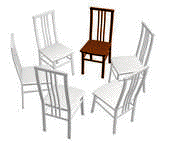
 Outlining and my father
Outlining and my father My father had a thing for outlining, and he was lucky because he had a son who learned how to program, and made outlining work on a computer.
The great thing about outlining is that you can reorganize. That's the purpose of outlining. You can't do it on paper. That's why people invented index cards. But they are one-level outlines. Not nearly as useful as the multi-level reorganizable outlines on a computer. Outlining works on a computer much better than it does on paper.
My father taught marketing to MBA students at Baruch College and then Pace University in NYC. Once we had outlining they learned how to plan their marketing campaigns with his son's outliner. His colleagues thought he was obsessing over his son, but I know my father. It wouldn't have occurred to him. It was the other way around. The outliner showed him that there were qualities to his son that he hadn't discovered. He loved outlines so much eventually he would say "Every day is Father's Day." It embarassed me at the time, but now it doesn't, it makes me feel his approval, which like it or not, is something every son wants from his father.
I, of course, used outlines too, but until recently, not in the way my father did. I used my outliners for two things -- one big and one not so big. The big thing is writing code and organizing the data the code operates on. Frontier, the programming environment I started creating in grad school, and completed in the early 90s, was entirely built around outlining. It wasn't in any way an afterthought. The assumption was that you had a tool that could manipulate hierarchy. For me, outlining and programming are inseperable. I've been programming in this environment for most of my adult life. Since 1989. 2012 - 1989 = 23 years. Unless Python or Javascript get all this, I doubt if I can work in any other environment. I'd be open to bringing those languages in.
Anyway, the second way, which until recently hasn't been a big deal for me, is organizing my work. People who worked for me would use MORE and ThinkTank that way. Especially the people whose jobs it was to ship products. My customers used the products that way, but until recently I didn't.
What precipitated the change, believe it or not, is Jeremy Lin.
James Burke did a great thing with his Connections series. He showed how what appears to be an insignificant coincidence turns out to create the serendipity needed for an idea to pop out of someone's mind. For me, it's been the endless hours I've spent watching basketball this year. At some point, while watching a game, I realized I could open my laptop and jot down an idea instead of using a reporter's notebook, which I used to buy by the dozen for recording ideas. One jotted idea turned into a plan. So the next day when I'd sit down to do my programming work, there would be the plan, ready to go. I didn't have to think about what comes next. That made it possible for me to work much more quickly. This is something you learn better as you grow older. There's value in stepping back and getting organized before taking on the next big task.
I suspect my father knew this. I think it would answer the questions he'd ask me about why I don't work harder to explain to people why outliners are so revolutionary. I couldn't explain it for the simple reason that I didn't know.
Outlining for me has always been an intuitive thing, and hard to verbalize. I saw hierarchies everywhere in computers. To me, it made sense to invest in that. If you were going to spend so much time dealing with hierarchy, why not put in a special effort to unify them. To make it so you always had a great tool for managing them, instead of a dozen so-so tools. To this day I don't understand why there isn't a generic reusable outliner baked into modern operating systems. There should be.
So now I'm on the cusp of releasing a tool that allows you to write directly onto the web in an outliner. The distance between the content on your machine and it being on the web is one mouse-click. That's exactly how far you want it to be. My father is not alive to see this, but if he were, he'd probably die from excitement. This is something he and I shared, at a genetic level, in our DNA, is this idea that the human mind can reach outside of itself, onto a computer, to make even more powerful and useful intellectual structures. Honestly, I wish he were here to share this with me.
Update: Takayuki Tanaka, from Yokohama, translated this essay to Japanese.
 Bubble frenzy
Bubble frenzy Okay yesterday was Facebook IPO day. How many times did you hear about it. What new information was added each time you heard. Why do we obsess so much about it. Did anything really happen? Blah blah blah. Yadda yadda yadda.
But it does have a real impact on our lives. I realized it yesterday after a meeting, where I ran into a bright dude, a real up and comer. He's smart. Has worked at some prestigious places. He just joined a startup.
He had been asking me questions via email about something I was working on. But I had already written docs that covered the questions he asked. Finally, meeting face to face, he asked the same questions. I asked why he couldn't put a few minutes into reading the docs. Then I realized, before he could answer -- which was good, because he was already gone -- no one is paying attention.
 I'm sure he'll read this, which is funny in a way. I don't mean anything personal. This is what bubbles do to us. Even if you're not going to hit the jackpot, all that money floating around still makes it hard to focus on things that take time. Rush. It's a game of musical chairs. The music will stop and you won't have a place to sit. It's all the more dangerous today because the employment situation, outside the bubble, is bleak. (Originally I said it's bleak for young people, but it's also true for people my age. No one is offering me any jobs. It's lucky I have savings.)
I'm sure he'll read this, which is funny in a way. I don't mean anything personal. This is what bubbles do to us. Even if you're not going to hit the jackpot, all that money floating around still makes it hard to focus on things that take time. Rush. It's a game of musical chairs. The music will stop and you won't have a place to sit. It's all the more dangerous today because the employment situation, outside the bubble, is bleak. (Originally I said it's bleak for young people, but it's also true for people my age. No one is offering me any jobs. It's lucky I have savings.)
I don't have any answers. I know it's hard to listen. But I feel these days like we all have our own gigs, and we're fighting for attention, because attention is where the money is, but none of us have any attention to give. Desperate. Flailing. I find myself wishing there were more people I could bounce ideas off, but there isn't much bounce these days.
So I think for most of us, the Facebook IPO is a transition, maybe to something better. A peak. It sure isn't making us rich. And it's not giving us much to hope either.